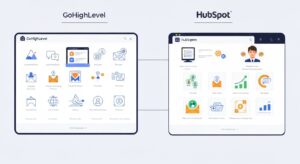Using AI-Powered Lead Scoring to Prioritize Fast Wins

Introduction
Every sales team knows how frustrating it is to follow up on leads that never turn into sales. Some chances really have the ability to be successful, but others are just a waste of time and money. Agencies have to figure out as soon as possible which leads need to be followed up on right away and which ones should be cared for more slowly.
In situations like these, CRM AI lead scoring is crucial. Using AI in a CRM system lets companies automatically select high-potential leads, making sure that sales teams focus their efforts where they will yield the most results. AI-powered lead score not only helps people make decisions faster, but it also helps them win more quickly by showing them the chances that are most likely to happen.
As customer standards keep going up and competition gets tougher, using AI-driven tactics is no longer a nice-to-have but a must. When it comes to both speed and success, agencies that learn how to use lead scoring well will always do better than their competitors.
What Is Lead Scoring (and Why It Matters)?
Lead scoring is the process of giving leads numbers, or “scores,” based on how likely they are to become customers. Rules that have already been set up are often used in traditional ways. For example, you might get points for getting an eBook, joining a meeting, or reading an email. Even though these manual models are useful, they can be rigid and not show how real buyers really act.
What’s wrong is that not every signal is the same. A lead who reads a blog post and then clicks away is not the same as a lead who looks at price pages and then books a test. Most old-fashioned score systems treat these parts the same, which means you waste time and energy on ideas that aren’t very good.
This is why AI judges are a big step forward. Look for trends in a huge amount of data, and AI can figure out which habits, demographics, and connections are really linked to sales. This makes the choice more accurate, so sales teams can focus on the chances that have the best chance of working out.
How AI-Powered Lead Scoring Works
AI-based lead score is more than just following rules. When you look at data and results from the past, machine learning models keep getting better. The system looks at a huge amount of information, such as your web history, email history, personal information, and even your social relationships.
The AI can guess how likely it is that a certain lead will close after being taught. These standards change all the time as the lead works with the company. For instance, a prospect’s score may go up a lot if they book a test or reply to a sales email all of a sudden. Their score might go down if they stop interacting with it all together.
Because AI ranking is always changing, it is much more powerful than standard methods. Instead of getting flat numbers, sales teams get real-time information about which leads are worth following up on.
Salesforce State of Sales says that teams that do well are over 1.5 times more likely to use AI tools to help them decide what to do first. AI isn’t removing human reasoning; it’s just making it better. This gives sales people the information they need to work smarter and close deals faster.
The Role of CRM in AI Lead Scoring
A CRM gives AI lead score the organization it needs to work. Data would be spread out among texts, files, and social media sites if there wasn’t a single system. This information is put together by a CRM, which gives AI models the clean, uniform records they need to make correct scores.
That means that all interactions, from clicks on emails to sales calls, are tracked and studied. Scores are not only kept in the CRM, but they are also used in processes. Leads scoring above a certain level can be sent straight to sales reps for follow-up right away, while leads scoring below that level can be put into nurture efforts.
HubSpot Sales Insights stresses that adding AI to CRM systems makes them more effective and cuts down on useless work. Teams can spend more time on the most important prospects by getting rid of the ones that aren’t likely to turn into sales. This increases both sales pace and win rates.
For agents, this means faster sales processes and more stable growth in income. The CRM doesn’t just keep track of friends; it also becomes a strong tool for setting priorities and moving things along quickly.
Benefits of CRM AI Lead Scoring
Multiple aspects of the sales process can benefit from crm ai lead scoring.
1. Faster response to high-value leads. The best leads can be found right away, so sales teams don’t waste time on bad chances. In line with the “speed-to-lead” concept, the first person to arrive usually gets the job.
2. Improved accuracy in forecasting. Managers can be more sure of their income predictions when they keep track of which leads are most likely to turn into sales. This helps groups better use their resources and set goals that are attainable.
3. Better alignment between marketing and sales. AI lead score fills in the blanks between how well marketing can find leads and how well sales can close them. Marketing gets a better idea of which campaigns bring in the best prospects, and sales gets better-qualified leads.
4. Enhanced client experience. AI gives prospects faster and more relevant contact, which makes them feel valued and understood. This makes people believe each other and speeds up the decision-making process.
Forrester Research has found that companies that use AI to score leads have much higher conversion rates than those that use models that are run by hand. The benefits are not just ideas; they have been shown to work in real life.
Common Challenges (and How to Overcome Them)
This is true for AI lead scores as well as any other tool. Poor data quality is a problem that agencies often have, which makes estimates that aren’t true. The AI will not be as useful if the CRM is missing important contacts or keeping track of data that isn’t reliable.
Investing in clean data methods is the answer. For calls, texts, meetings, and everything else, the CRM should keep track of it all. The AI will be able to make more accurate guesses if the information is bigger.
Another problem is relying too much on AI. Scores are very useful tools, but they shouldn’t be used instead of your own judgment. It might still be worth going after a lead with a lower score if they could be a strategic account or referral chance. Teams that do well use AI to help them make decisions, not as the only thing they do.
Last but not least, some agencies worry that prospects will not feel connected to AI. The truth is that AI works in the background and helps workers be more human, not less. By giving priority to the right leads, sales reps can spend more time with important chances and less time waste time on unqualified ones.
Real-World Example: Winning with AI Lead Scoring
A creative firm that got dozens of leads every week had trouble keeping up with demand. When sales workers spent too much time on bad prospects, they missed many high-value leads until it was too late.
The business saw gains right away after adding CRM AI lead score. High-scoring leads were sent immediately to top reps so they could follow up quickly. Leads with lower scores were put into training efforts that gave them value over time without needing them to be directly involved with sales.
The firm cut the average length of the sales cycle by 25% and improved the number of conversions by 30% in just six months. The most important thing is that sales people said they felt better because they weren’t chasing leads that weren’t likely to close. Thanks to AI, the team was able to focus on “fast wins,” which improved both speed and performance.
Preparing for the Future of AI in Sales
In the future, AI will shape how sales are sped up. As prediction models get better, they will not only find leads, but they will also suggest the best ways to communicate, the best times to do so, and even the best ways to set prices. Companies that use AI now are making systems that will get better over time to get ready for the future.
HubSpot says that companies that use AI tools in their sales processes have better flows and complete more work than companies that don’t use AI tools. People used AI to stay ahead of the competition, but now it’s a must-have in markets that change quickly.
Combining AI with CRM systems is the next great step forward in sales. That way, a company may perform more work, get along better with customers, and remain ahead of rivals that move more slowly.

Conclusion
In sales these days, quickness and accuracy are absolutely key. When people travel down the wrong routes, they waste time, energy, and things they can’t purchase. The nice thing about CRM AI lead score is that it can go through all the options and find the most significant ones. This helps sales teams stay on track with the tasks that will help them win quicker.
Using both CRM systems and AI-driven insights may help agents close deals faster, make better assumptions, and identify better prospects. You can see that AI-based lead scoring isn’t only the future with the aid of Salesforce, HubSpot, and Forrester. It’s already here.
Right now, a business has to employ CRM AI lead scores to make sure they don’t miss any opportunities and can figure out how to be successful in the long term.







